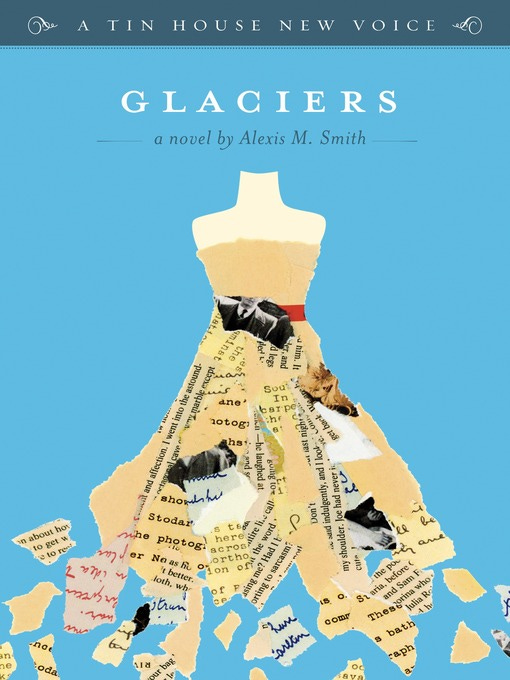Glaciers
By Alexis M. Smith
Tin House Books: July 25, 2023
Reissued with an introduction by Maris Kreizman
$15.95, 128 pages
This is my original review from July 16, 2013 (when this blog was one month old)
I learned about Glaciers only recently via bookish accounts on Twitter. I hadn't read anything about it or seen it on display in a book store. But among those who have read it, it is widely admired, even loved. In short, it was said to be a small but precious gem. I can now say I agree with that assessment.
Glaciers at first seems a bit too coolly beautiful. But as the story of a day in the life of young librarian Isabel progresses, Glaciers steadily warms up until, ultimately, like the title object, it calves, revealing its blue heart and making an indelible impression on the reader. Alexis Smith’s writing is lean prose-poetry with a quiet narrative current below the surface. There is not a wasted or misplaced word anywhere. And there are countless sentences and even paragraphs that demand to be flagged for their sharp insight into the foibles of human nature or Smith’s felicitous use of language.
Isabel is a twenty-something single woman who works in the basement of a Portland library, where she repairs damaged books. As you might expect of someone in that job, she is quiet and observant and carries a shy heart in her slight frame. She has long been intrigued by old postcards, photos, and letters, remnants of others’ lives. She imagines the lives of those who sent the postcards, took the photos, and wrote the letters, trying to fill in the gaps in her knowledge. Having grown up in Alaska, Isabel is fascinated with the outside world, both the continental U.S. and “faraway places” like Amsterdam. The narrative moves back and forth in time between the present and key moments in her childhood, reminding us that we carry our past with us at all times, and it only takes a nudge in the here-and-now to pull us back to those moments, good or bad, that shaped us.
Glaciers follows Isabel as she tries to sort out her feelings for Spoke, the IT guy at the library and an Iraq War veteran. She feels her way forward as if she is making her way across a minefield, wary of making even a single misstep. They connect, tenuously, tentatively, suggesting a potential relationship, but it remains in question, even fraught, for most of the day. Is Spoke “damaged” or just a quiet, thoughtful guy, a kindred spirit for Isabel?
“[She] lets herself think of Spoke. She imagines walking with him, like this, through the city. Telling him how cold air and leaves and gasoline smell like the first day of school to her. It’s a strange product of infatuation, she thinks. To want to tell someone about mundane things. The awareness of another person suddenly sharpens your senses, so that the little things come into focus and the world seems more beautiful and complicated.”
At the same time, Isabel is preoccupied with a party she plans to attend that evening. Will she find a way to ask Spoke to join her? Will it be a date or just two co-workers having fun together? Seeking a new party dress, she visits her favorite vintage clothing shop, Lola’s.
“Isabel looks around and quietly inhales. She loves the smell of old things . . . She moves among the clothes, eyes drifting up to the dresses suspended from the ceiling, hovering far above her head, swaying, as if dancing. She wonders what a group of dresses would be called, if they were living things: a choir, she thinks, a choir of dresses.”
The owner remembers her from the time she needed an outfit to make her look like Nancy Drew. She finds the perfect dress, from the Sixties; the owner had recently purchased it at an estate sale, a remnant of a life lived, like the old postcards, with a story to tell.
“The cool fabric settles over her skin, and she thinks how this might be the first time in decades that a warm body has filled this space . . . Isabel turns to the mirror, bare feet pivoting on the geometric linoleum. In her reflection, she can almost see the girl who wore the dress before her.”
“‘It’s never the wedding dresses, you know,'” the owner tells Isabel. “‘We keep those, too, but only because they’re so blooming expensive. No, I’ve seen enough old ladies’ closets to know what we really hold on to. Not the till-death-do-us-part dresses. It’s those first lovely dresses: the slow dance dresses, the good-night-kiss dresses. It’s those first pangs we hold on to.'”
Isabel returns to the library wondering how to ask Spoke to attend the party with her. But he is carrying a secret that will affect all of his colleagues at the library, not just Isabel.
Glaciers reminds me of classic novellas, with its spare but poetic language full of piercing insights into the past, present, and possible future. I suspect it will reward re-reading. Although it took perhaps two hours to read, Glaciers has stayed with me for much longer than that.
Alexis M. Smith grew up in Soldotna, Alaska and Seattle. She attended Mount Holyoke College, Portland State University, and Goddard College. Her debut novel, Glaciers, was a finalist for the Ken Kesey Award and a selection for World Book Night 2013. Her second novel, Marrow Island (2016), won a Pacific Northwest Booksellers Association Award and a Lambda Literary Award. She lives in Spokane, Washington.




